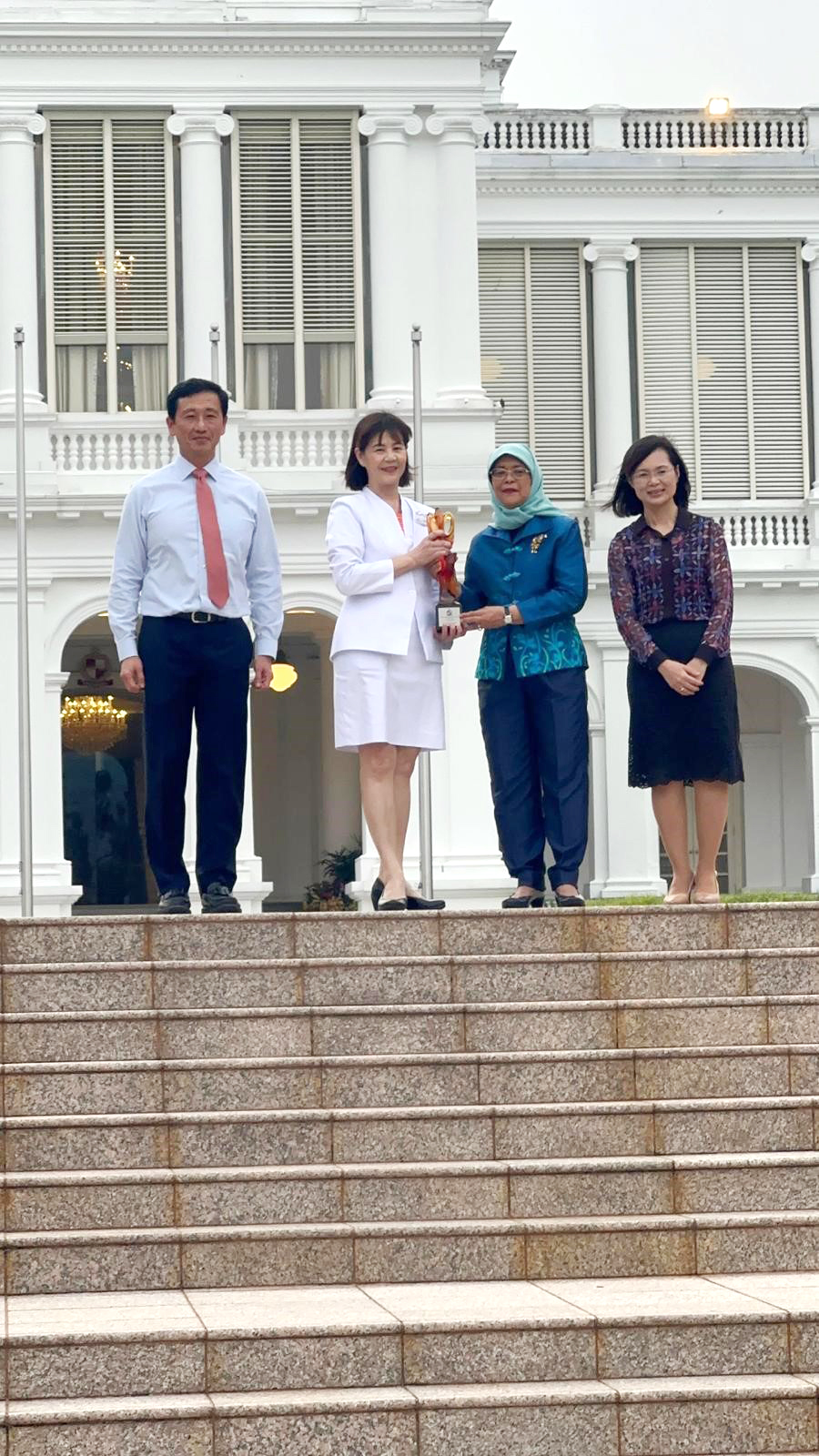
Recipient of the President’s Award for Nurses 2023 Dr Loh Huey Peng, Director of Nursing, Singapore National Eye Centre (SNEC), shares the seven important phases that have made an impact in her Nursing journey.

Dr Loh Huey Peng (right).
- TTSH Surgical Ward
First Appreciation of Nursing
“My mother was a nurse, so she encouraged me to join Nursing,” Dr Loh said. “I decided to give it a shot—and that’s how I got into Nursing. But the training was tough, the pay was low—and after three years of training, I was struggling to find purpose and meaning in Nursing.”
Fresh from Nursing training, at the age of 21, Dr Loh was posted to the surgical ward of Tan Tock Seng Hospital (TTSH). “Unlike today, surgical wards back then had over 40 beds. Two patients could go into cardiac arrest at the same time, and you had to use your critical thinking and situational awareness to decide who to prioritise.
“That was when I discovered—even as a junior nurse—I could manage complex day-to-day coordination in the ward. As long as I kept a clear head, I could handle any difficult situation,” she explained. “To this day, I think those first three years were instrumental in building my fundamental Nursing skills and a strong sense of self-resilience.”
- TTSH Major Operating Theatre
Discovering Ophthalmology Nursing
After three years, Dr Loh decided to take on a new challenge: scrub Nursing. “Moving from surgical ward to operating theatre (OT) was a steep learning curve,” Dr Loh said. “Many people thought I wouldn’t survive.
But there, Dr Loh discovered a new interest: ophthalmology Nursing. “Few scrub nurses were assigned to Eye OTs to do eye operations. The Eye OT process was largely self sustained from end-to-end care including sterilisation, washing, packing and checking. But this allowed me to appreciate the entire procedure—understanding the rationale behind each step and the use for each instrument.”
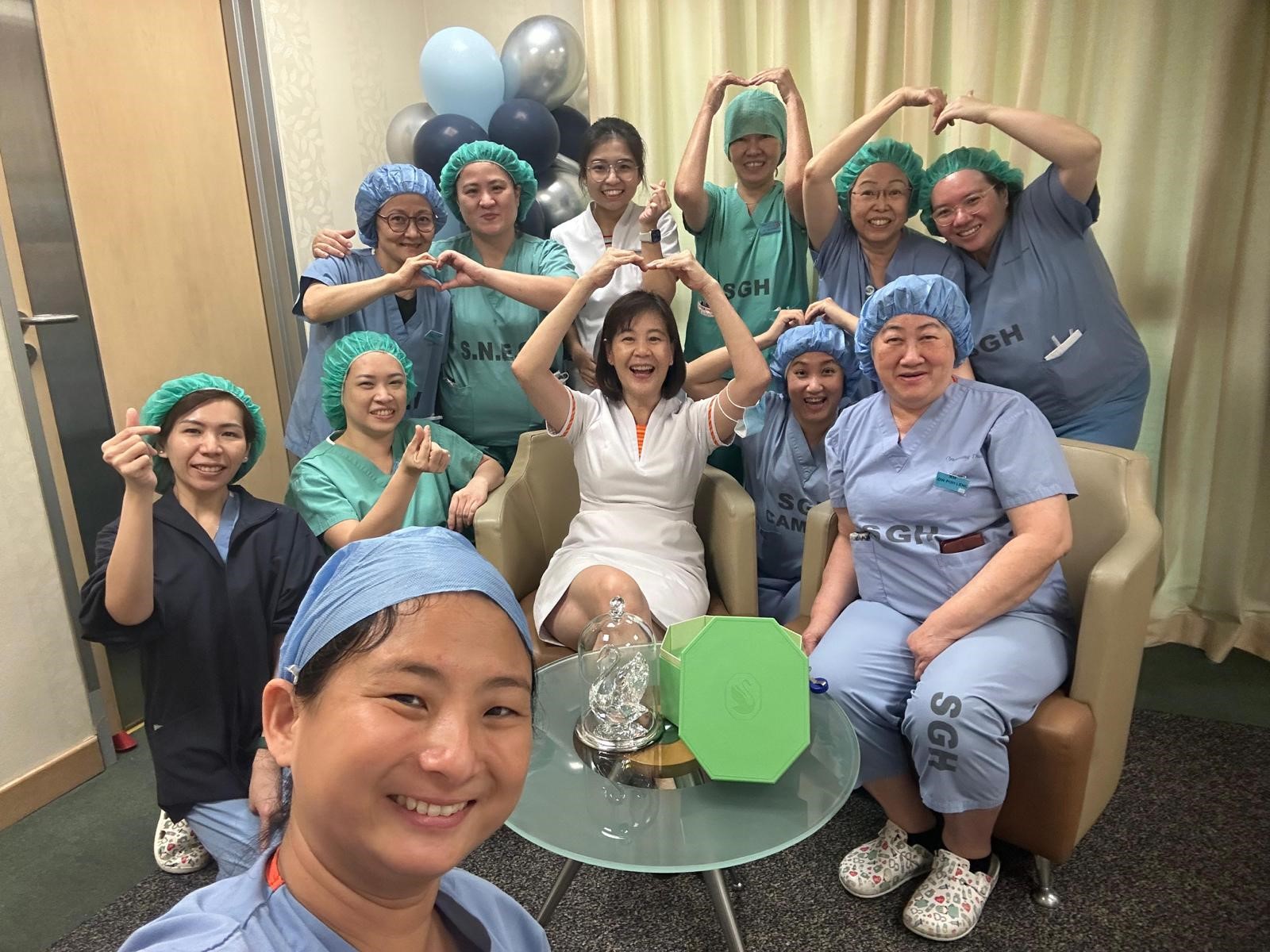
III. Singapore National Eye Centre Operating Theatre
Becoming a Novice All Over Again
When SNEC had an opening, Dr Loh took the opportunity. “I thought I knew all about eye surgery from my TTSH experience. But in reality, I became a novice all over again,” Dr Loh said. “The pace of work was three times more, the load 10 times more and expectations so much more than I imagined. But at the same time, this was something new to master.”
Dr Loh decided to come in early before each shift to familiarise herself with the procedures and observe her colleagues at work. “It started with trying to see where I could speed up. Then it became how to be better than others, and eventually what we can all do differently or more simply. Bit by bit, these challenges kept me going.”
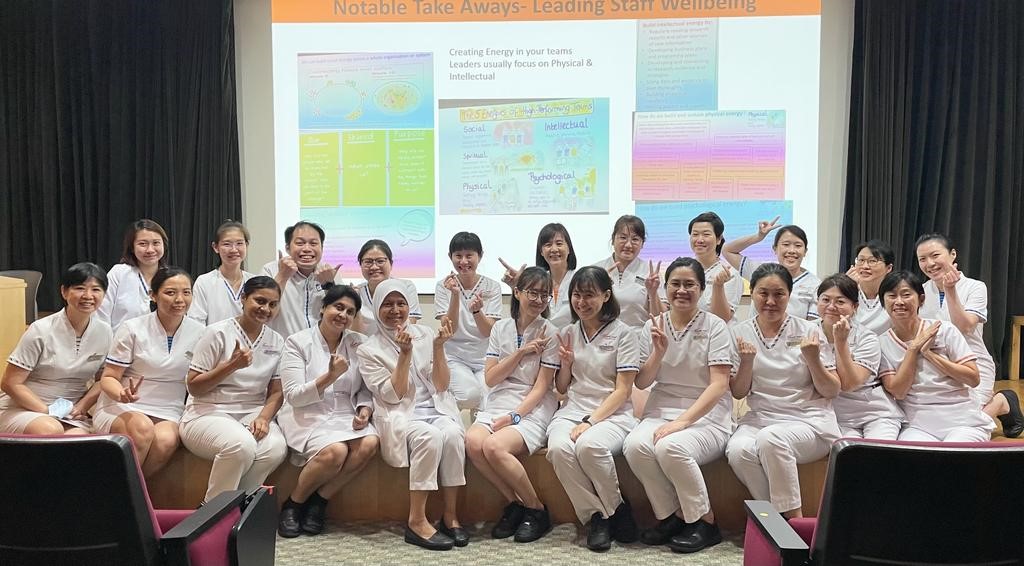
- SNEC
Leading Juniors, Contemporaries and Seniors
As Dr Loh moved up the ranks, her relentless spirit for improvement also translated to her leadership style. “I’m always looking to challenge the status quo,” she said. “‘How can we improve this? Is this necessary?’ are questions that I not only ask myself—but also my team members.”
She explained, “For example, whenever they present data to me, I would always ask them if that information adds value to their work. If it doesn’t, then there’s no need to continue collecting the data. As I often say, ‘Value what you do, and add value to what you are doing.’”
Putting her own advice to work, Dr Loh calibrates her leadership style to different generations in her team. “When I led team members who used to be my contemporaries or seniors as a young leader, I had to balance between maintaining our working relationship and showing them respect—so I consciously involved them in my decision making.
She admitted, “But leadership is an art. Some of the methods which worked previously would backfire today—especially with our younger nurses who tend to be more educated, so I am always exploring how I can adapt my leadership to achieve the same outcome.”
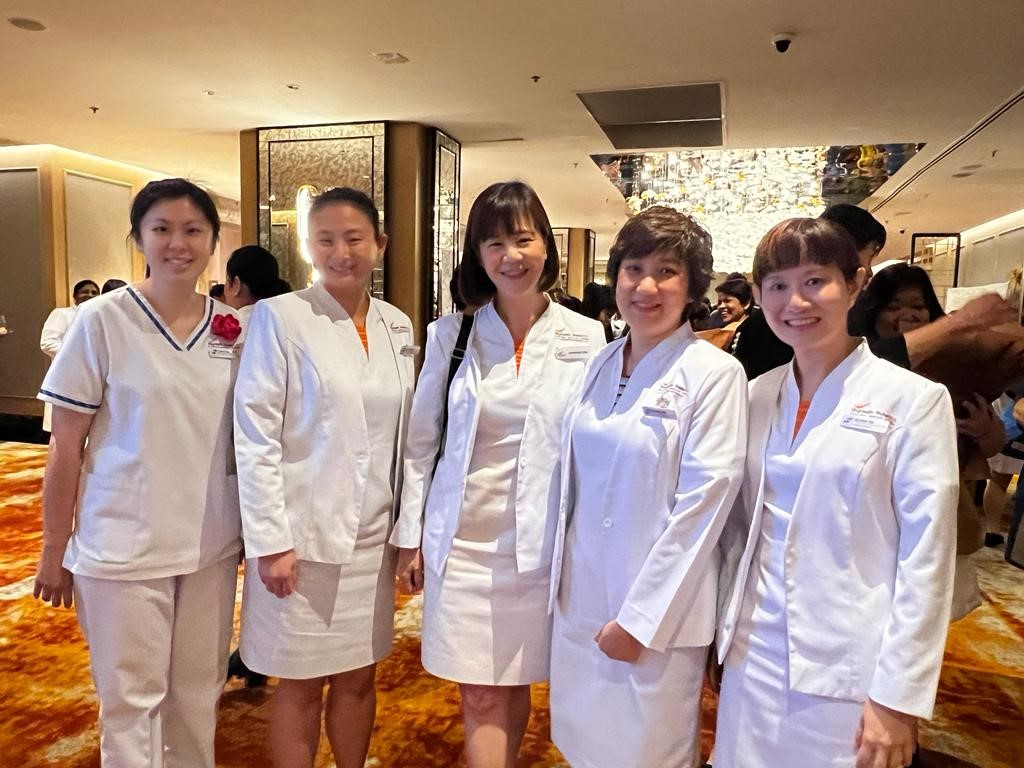
- SingHealth Community Care Facility@Expo
Stepping Up for COVID-19
When the COVID-19 pandemic hit, Dr Loh was tasked to lead the SingHealth Community Care Facility@Expo. “It was stressful setting up a facility for over 3,000 patients in under a week. To top it off, some of our staff were volunteers and not Nursing trained, but we were so shorthanded that we just had to take anybody who came.”
Dr Loh’s leadership and strong conviction about patient safety came in handy. “Besides aligning everyone on the same purpose, we had to work out how to ensure that none of us got infected and none of the patients under our care became worse off. This resulted in many group huddles, organising into small leadership groups—and whiteboarding. Finding answers to questions like ‘What can we do differently?’ and ‘Can we automate this?’ was an everyday affair. In the end, despite the challenging circumstances, everyone worked well together.”

- NUS Nursing
Getting a PhD—Part-time
As a PhD is not a requisite for Nursing career progression, only a handful of nurses go on to attain PhDs. Dr Loh was one of them. “After getting my Bachelor’s and Master’s, a PhD was the obvious next challenge. I chose to do it part-time and so for 5 years, I would make arrangements to finish my work early to attend classes at NUS Nursing. A lot of pre-planning went into it—even up to a year ahead so that I could inform my boss about my schedule in advance.
“Even then, it’s extremely challenging to be managing everyday work concurrently. For instance, I had to defer my PhD Qualifying Examination (PQE) because we had a critical time at work and were severely short-handed—I couldn’t focus on my PQE,” Dr Loh reflected. “For any Nursing colleagues looking to do a PhD, I would recommend that they do it full-time.”
Dr Loh eventually completed her PhD on patient safety in 2021. “At that time, there wasn’t much soft skills training like situational awareness available for scrub nurses,” she explained. “These soft skills are crucial for patient safety, yet nurses are expected to learn on the job—so I came up with a game-based intervention to train OT nurses. It was gratifying to apply my research to develop actual clinical processes and practices.”
There is another upside to getting a PhD. “Going through the academic rigour made me appreciate the research process. Now I feel more confident discussing research and literature review with clinicians. It also strengthened my ability to think through the rationale when I evaluate and implement policies and procedures.”
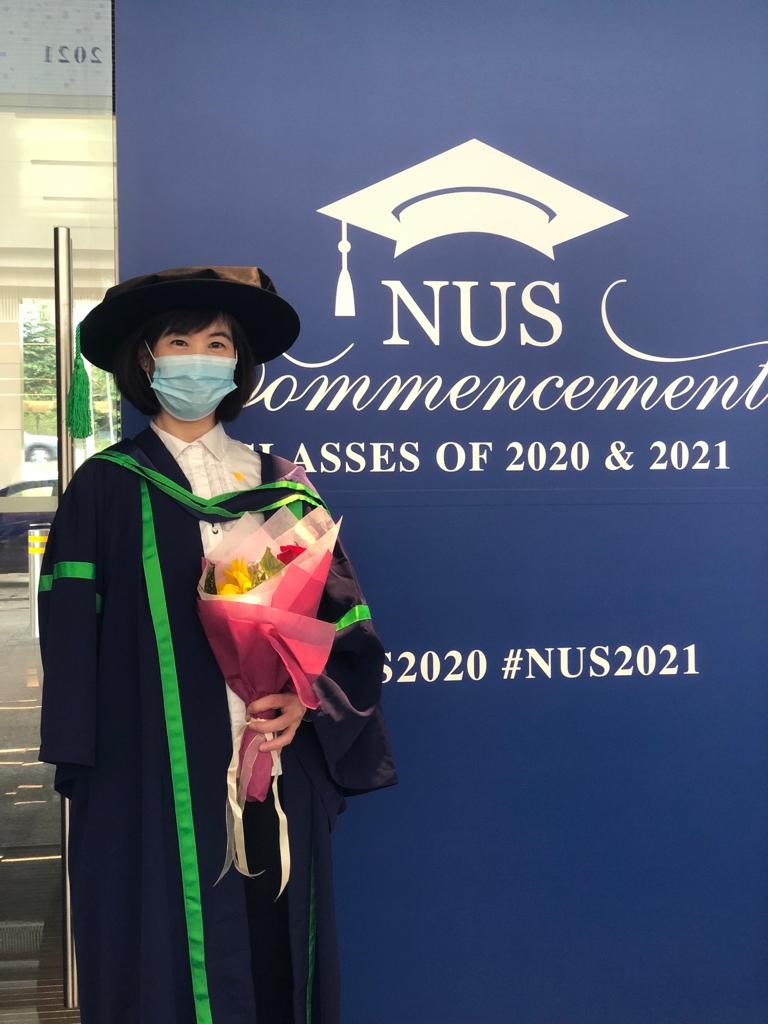
VII. Recognition
Receiving the President’s Award for Nurses 2023
On 28 July 2023, Dr Loh received the President’s Award for Nurses 2023. “Receiving the Award was an honour, but also a surprise,” Dr Loh said. “To me, I was just doing what I’m passionate about—whether it’s leading the Nursing team at SNEC, doing my PhD or helming SingHealth Community Care Facility@Expo.”
On what’s next in her books after receiving Singapore Nursing’s highest accolade, Dr Loh said, “For now, I’m excited to continue working with my colleagues—both new and old. With younger leaders from diverse backgrounds stepping up to run clinics independently and contribute ably in multidisciplinary teams, it’s a great time to be in Nursing.
“I hope that one day I will be able to teach—pass on my knowledge and help our future generations of nurses find purpose and meaning in Nursing.”


